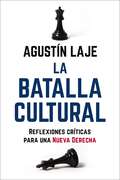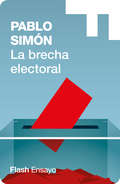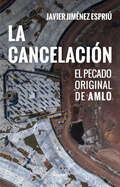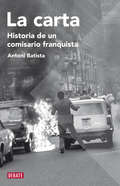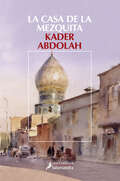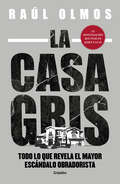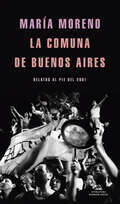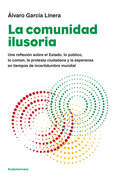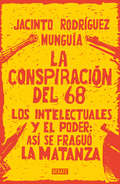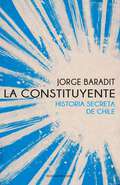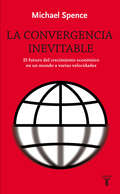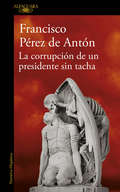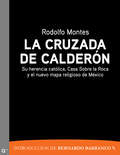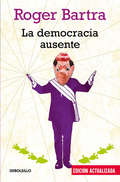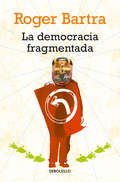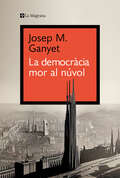- Table View
- List View
La batalla cultural: Reflexiones críticas para una Nueva Derecha
by Agustin LajeEl afamado escritor, politólogo, y conferencista Agustín Laje presenta La batalla cultural: Reflexiones críticas para una Nueva Derecha – un manifiesto que informará, animará y facultará a los &“guerrilleros culturales&” para no bajar los brazos en la batalla que sigue perjudicando a nuestras familias y a la sociedad en general.En el mundo contemporáneo, la sociedad y la cultura cambian a gran velocidad. La voluntad de dirigir esos cambios está en la base de las batallas culturales que hoy se viven en todas partes. Bien investigado y argumentado inteligentemente, este libro define el concepto de batalla cultural y muestra hasta qué punto la cultura ha llegado a ser el botín principal del poder, cómo se han desarrollado estas batallas desde los tiempos modernos hasta la actual posmodernidad y cómo enfrentarlas.En este libro, Agustín Laje:Explica qué es la batalla cultural, cómo darla, y cuales son su característicasAnaliza cómo la nueva izquierda entendió este fenómeno, frente a una derecha que menospreció el poder de la culturaExamina cómo entendió este fenómeno la nueva izquierda, frente a una derecha que menospreció el poder de la culturaPretende brindar las herramientas necesarias para el nacimiento de una nueva derechaEste libro está dirigido a: Las familias que son el principal blanco de ataque en este momento, que se sienten fragmentadas, amedrentadas y que quieren hacer algo más para convertirse en agentes de batalla culturalA los Jóvenes que cursan sus estudios y que entienden que en sus universidades cada vez hay menos educación y más adoctrinamientoA todo aquel que se preocupa por los asuntos políticos y mundiales de gran magnitud que crean conflictos en la sociedad&“La lucha política y la lucha cultural son las dos caras de una misma moneda. Si no hay política sin hegemonía, entonces tampoco hay política sin batalla cultural&”, dice Laje. &“La batalla cultural terminará mostrándose como la madre de todas las batallas.&”The Culture BattleFamed writer, political scientist, and lecturer Agustín Laje presents The Culture Battle: Critical Reflections for a New Right – a manifesto that will inform, encourage and empower the &“cultural guerrillas&” not to give up in the battle that continues to harm our families and society in general.In the contemporary world, society and culture are changing at great speed. The will to lead these changes is at the basis of the cultural battles that are being fought everywhere today. Well researched and intelligently argued, this book defines the concept of cultural battle and shows to what extent culture has become the main spoils of power, how these battles have developed from modern times to today's postmodernity and how to face them.In this book, Agustín Laje:Explains what the culture battle is, how to wage it, and what its characteristics areAnalyzes how the new left understood this phenomenon, in the face of a right wing that underestimated the power of cultureExamines how the new left understood this phenomenon, in the face of a right wing that underestimated the power of cultureAims to provide the necessary tools for the birth of a new right wing
La brecha electoral
by Pablo SimónPablo Simón recoge las claves necesarias para enfrentarse a votar con conocimiento de causa. ¿Qué necesitas saber ante unas inminentes elecciones? Cuando vas a darle tu voto a un partido, ¿lo haces mirando hacia los proyectos fracasados o de cara a las promesas del futuro? Todo depende del contexto. Es necesario mantenerse informado, teniendo en cuenta los errores cometidos y pensar en si existe la posibilidad de que se repitan o no. ¿Cómo afectan las brechas sociales, económicas y políticas en los resultados de las elecciones de una sociedad fragmentada?
La cancelación
by Javier Jiménez EspriúLas razones de la polémica decisión de cancelar el NAICM, expuestas por uno de sus principales protagonistas. La decisión de cancelar el aeropuerto que había empezado a construirse en Texcoco durante la administración de Peña Nieto, sin duda fue “el sello, el punto de partida, el pecado original” del gobierno de Andrés Manuel López Obrador. En este libro documentado con suficiencia y por tanto valioso para el debate público, quien fuera secretario de Comunicaciones y Transportes revela los pormenores de tal determinación tan polémica, sosteniendo que desde su concepción el NAICM fue un proyecto sin futuro, plagado de anomalías estructurales que tarde o temprano lo harían estallar. Todo lo que afirma Jiménez Espriú está sustentado como es debido, de tal forma que aquí se encuentra con todos sus pormenores la historia de cómo y porqué se determinó la cancelación, a pesar de sus consecuencias; esto último ha hecho que gran parte de la opinión pública consideré este asunto como un expediente abierto. Así, el libro tendrá un primer círculo de lectores formado por analistas, expertos en el tema, académicos, profesores, estudiantes y ciudadanos en general, todos ellos interesados en el debate. Pero también despertará el interés de un círculo más amplio constituido por quienes siempre apoyaron la decisión presidencial.
La captura de Macalé
by Andrea CamilleriLa nueva obra de Camilleri es una personalísima fábula sobre la brutalidad y la inocencia traicionada. Sicilia, año de gracia de 1935, en plena guerra de Abisinia. Michelino es un niño de seis años, inteligente y precoz, que intenta asimilar lo que ocurre a su alrededor con los mecanismos propios de suedad, intuyendo las cosas aunque sin llegar a comprenderlas. Hijo de Gerlando Sterlini, fascista ejemplar y prohombre de Vigàta, Michelino se abre paso en un mundo enfermo y peligroso, descubriendo, demasiado rápido como para salir indemne, la cara oscura y miserable de los adultos. Numerosos personajes se entrelazan en el devenir diario de la vida de Michelino: desde los padres, tan lejanos como absortos en consumar sus pasiones y ambiciones, hasta el avieso profesor Gorgerino, pasando por el engañoso sacerdote Burruano,la irresistible prima Marietta o el cruel Balduzzo, héroe de la conquista de la ciudad africana de Macalé.Todos ellos contribuyen a transformar un despertar a la vida lleno de situaciones de tierna comicidad, en una tragedia que simboliza el horror de que es capaz el ser humano. Sobre el telón de fondo de una Italia provinciana inmersa en la complacencia ante una dictadura de éxitos deslumbrantes, Camilleri dibuja una realidad gris y brutal, anegada de corrupción y salpicada de episodios cotidianos de un dramatismo tan hilarante como sobrecogedor.Andrea Camilleri, hoy por hoy el escritor más popular de Italia y creador del entrañable comisario Salvo Montalbano, hace gala una vez más de su dominio magistral del lenguaje para crear exuberantes universos y personajes que nunca dejande conmover por su vigor y profundidad.
La carta: Historia de un comisario franquista
by Antoni BatistaLa historia del comisario franquista Juan Creix: una crónica histórica esencial para comprender las tensiones de un régimen en descomposición. Quizá el hecho más destacado de la biografía de Juan Creix sea haberse convertido en el único mando de la policía política franquista depurado antes de la muerte del dictador. En los estertores de la dictadura, los sectores moderados del régimen necesitaban posicionarse para el pacto inevitable de la Transición, y el comisario Creix constituía un grave problema: era el arquetipo de la represión contra esos demócratas con los que tendrían que entenderse en un futuro próximo. La reacción de Creix se encuentra en este libro: escribe una larga carta en la que relata sus servicios al régimen y la envía a quienes pueden ayudarle. En ella traza una completa historia de la represión a modo de biografía epistolar y da cuenta de sus operaciones más importantes: en Cataluña detenciones de comunistas y anarquistas y destacadas operaciones contra el movimiento obrero y estudiantil; en el País Vasco arrestos de los miembros de ETA que han matado a Melitón Manzanas, su antecesor, sentando en el banquillo a los encausados en el Proceso de Burgos; en Sevilla, adonde le llevan sus éxitos en Euskadi como jefe superior de Policía de Andalucía, se ha enfrentado a Comisiones Obreras y a un notorio delincuente común: el Lute. Su carta es un testimonio excepcional que ha permitido a Antoni Batista trazar un bosquejo de la durísima represión sufrida por quienes se enfrentaron a la dictadura y un retrato psicológico del que fue uno de sus principales comisarios.
La casa de la contradicción
by Jesús Silva-Herzog Márquez«Pensemos en la democracia no solamente como régimen de la complejidad, sino como régimen de la contradicción.» La democracia es el espacio donde desembocan todos los ideales políticos de la modernidad. Ahí confluyen impulsos no sólo diversos sino incluso contrarios: la aspiración de identidad y pluralidad, de liderazgo y contrapesos, de libertad e igualdad, de soberanía y tolerancia, de participación y prudencia. Por ello, la contradicción no es un accidente de la democracia: es su esencia. Si la democracia es una casa a la medida de nuestras incompatibilidades, en nuestro país la construcción sigue en obra negra. Peor aún: hay señales que apuntan a sus ruinas prematuras. Jesús Silva-Herzog Márquez advierte que la razón de este incumplimiento es, precisamente, el rechazo de la contradicción. Los gobiernos de la alternancia quisieron levantar el edificio democrático confiando en la magia de la competencia electoral, sin un andamiaje de legalidad. Sus efectos fueron corrupción y violencia. Las fallas de este intento impulsaron una nueva y quizá más peligrosa forma de simplificación: el populismo. Este ensayo sobre la frustración democrática es una crítica urgente a la política de nuestros días, pero es también, y sobre todo, una honda reflexión sobre la naturaleza de la democracia y el ser político de México.
La casa de la mezquita
by Kader AbdolahEn esta epopeya familiar de marcado tono autobiográfico donde confluyen la rica cultura persa y la vida cotidiana de los iraníes, el autor retrata una sociedad islámica moderada, ligada a una sabia y fértil tradición milenaria y alejada de todo radicalismo. Durante generaciones, la poderosa familia de Aga Yan ha ocupado una posición privilegiada en la tranquila ciudad de Seneyán. Siguiendo una tradición secular, el clan habita un caserón de treinta y cinco habitaciones adosado a la mezquita, una enorme y animada colmena llena de abuelas, niños, sirvientes, comerciantes y santones. Por el edificio fluyen historias fascinantes, y allí conviven el poder económico y el poder espiritual, la religión y la vida social, las pasiones y los rezos. Sin embargo, todo cambia en los años setenta, cuando la religión se convierte en arma política y pone fin a décadas de armonía. Los grupos de izquierdas contrarios a la occidentalización delpaís y los extremistas islámicos provocan la caída del sah, y el regreso del ayatolá Jomeini marcará drásticamente el destino de la familia. Sin duda uno de los narradores contemporáneos más destacados de los Países Bajos, el escritor de origen iraní Kader Abdolah, obtuvo un rotundo éxito con esta novela, elegida por los lectores neerlandeses como segundo libro preferido de todos los tiempos. Reseñas:«Una obra maestra, con un estilo lírico y un ambiente que alterna lo idílico y lo sombrío.»Trouw «Un grandísimo escritor dotado de una prosa concisa, fabulosa y exacta.»La Stampa «La nueva novela de Abdolah es una oda a la inmortalidad y la magia de la palabra escrita y a su capacidad para modificar el destino.»Brabants Dagblad «Abdolah cuenta en persa y escribe en europeo. Su obra posee la capacidad de modificar nuestra estructura mental, nuestro modo de escribir y sentir.»24 Ore «Abdolah evoca con intensidad la tragedia iraní. La casa de la mezquita, una conmovedora epopeya familiar, es su mejor novela.»NCR Handelsblad
La casa gris: Todo lo que revela el mayor escándalo obradorista
by Raúl OlmosLa Casa Gris reveló un rostro muy distinto de la 4T. Evidenció que abundaba la riqueza donde se exigía austeridad, que imperaba el ocultamiento donde se presumía transparencia, que la suciedad prevalecía donde se pregonaba pulcritud y que la hipocresía anidaba en el palacio de la pureza. Sin embargo, eso es sólo la punta del iceberg. Lo más importante de La Casa Gris es que descubre y resume un modo de operar y de gobernar. Las irregularidades en torno a la mansión de Houston son prácticamente las mismas que se han documentado en otros escándalos de Morena y el círculo íntimo del presidente: conflictos de interés, recursos de procedencia inexplicable, influyentismo, uso político de las instituciones, amiguismo, descalificación sistemática, nepotismo, opacidad… Este libro lo demuestra. Raúl Olmos -quien encabezó la investigación sobre la residencia texana- actualiza, enriquece y profundiza el reportaje original, pero también indaga en los negocios y los personajes a los que llevó ese trabajo periodístico. Cuenta la historia de la "señora del dinero", su círculo de cabilderos, la red de Baker Hughes, el papel del supersecretario Esquer y los contratos y negocios vinculados. Incluye asimismo la reacción que hubo en Palacio, con la furia del presidente, los entretelones de la investigación y los documentos y fotografías con que se confirmó la historia que cimbró a Andrés Manuel López Obrador.
La caída del cielo: El cristianismo posmoderno y las herejías de la New Age
by Jorge LandaburuUna formidable caminata sobre temas filosóficos, políticos y religiososde la segunda mitad del siglo XX, iluminada por la lucidez. Landaburu registra y observa todo, «de la iconología a los documentos,de la religión a la política, de lo sutilmente sublime a lo sutilmentepagano» para llegar a conclusiones que, si bien se asoman peligrosamenteal abismo o a la alarma, alcanzan su dimensión verdadera en laargumentación coherente y precisa que el autor encuentra.Una pregunta retórica habitual en las contratapas de este tipo de librostrata a menudo de atraer extremos opuestos para que el lector adviertala diversidad de intereses en juego. Landaburu comienza siendoanecdótico, prodiga luego un vagabundeo a lo Sebald «acercándonossiempre a nuestros límites territoriales» y alcanza un raro esplendor,infrecuente en el ensayo argentino, cuando orquesta cada uno de estosrecursos en la cámara acústica del pensamiento filosófico occidental,de los presocráticos a Heidegger.
La caída del telepresidente: De la imposición de las reformas a la indignación social
by Jenaro VillamilAuge y declive del peñismo: el gran montaje sucumbió y se transformó en una profunda crisis. En este libro Jenaro Villamil describe puntualmente cómo sobrevino ese proceso de decadencia. Jenaro Villamil describe puntualmente cómo sobrevino la decadencia del llamado Mexican Moment, así como las acciones del régimen peñista a partir de esa crisis. Con prólogo de Elena Poniatowska. Auge y declive del peñismo: el gran montaje sucumbió y se transformó en una profunda crisis. En este libro Jenaro Villamil describe puntualmente cómo sobrevino ese proceso de decadencia. El llamado Mexican moment, sobrevendido con la promesa de magnas reformas estructurales, pronto se evidenció como una farsa, y los propios medios extranjeros que al principio alabaron al joven presidente comenzaron a descubrirla: se encontraron con un país de narcofosas, de miles de desaparecidos, con la historia trágica de los 43 estudiantes de Ayotzinapa, con una reforma energética que resultó inoperante ante la baja de los precios del petróleo y con la corrupción nada disimulada del primer círculo de colaboradores del ejecutivo. Ante la caída, Peña Nieto ha optado por volverse un caudillo arcaico; busca el efectismo mediático sin principios ni hoja de ruta, convirtiendo así el cinismo en el disfraz del fracaso. No obstante, subraya el autor, la ambición de una presidencia imperial no dejará de estrellarse durante los próximos años con una fuerte y crítica resistencia social. Extracto del prólogo "Jenaro Villamil analiza no sólo la personalidad de Enrique Peña Nieto, también examina su proyecto de nación -que a los ojos de sus opositores es inexistente-, critica las reformas estructurales con las que el priísta intentó transformar al país y muestra cómo su gobierno está en franca decadencia a causa de la ineptitud para solucionar los conflictos económicos, sociales y de seguridad. Los pobres son más pobres, los niveles de violencia e inseguridad se dispararon y el presidente encopetado se quedó impávido. A EPN el cargo le ha quedado grande." Elena Poniatowska
La censura horizontal: Un nuevo tribunal digital
by Javier Horacio Contreras Orozco«Javier Contreras ha escrito un libro excepcional y necesario en estos tiempos de tecnologización de la vida pública.» Ignacio Solares Hoy en día las redes sociales son mucho más que simples herramientas de entretenimiento, información y socialización: una parte de nuestras vidas transcurre dentro de ellas. Han ampliado nuestra capacidad de comunicación de forma inaudita, le han dado voz a personas que antes no la tenían y, sobre todo, permiten que la información fluya con una velocidad y en volúmenes sorprendentes. Sin embargo, estas características no han hecho de las redes sociales los espacios de diálogo y tolerancia que esperábamos de ellas. Por el contrario, con frecuencia las hemos visto convertirse en la gran hoguera del siglo xxi. En este libro, Javier Horacio Contreras Orozco analiza las condiciones y procesos que han llevado a las redes sociales a constituirse en un jurado universal que ejerce un nuevo tipo de censura: la poscensura o censura horizontal. A diferencia de la censura tradicional, que provenía de los gobiernos o de poderosos intereses privados, la censura horizontal es un sistema de vigilancia y silenciamiento entre pares. Un tribunal sin juez o, mejor dicho, en el que todos son jueces, pero en el que también todos pueden ocupar el banquillo de los acusados de un momento a otro. Al excluir a una gran cantidad de voces del debate público, la censura horizontal contribuye a la pandemia de desinformación que caracteriza nuestros días. Es uno más, como advierte Contreras Orozco, de los síntomas de la era de la posverdad.
La comuna de Buenos Aires: Relatos al pie del 2001
by María MorenoCrónicas, entrevistas y reflexiones realizadas en los meses que siguieron a la crisis de diciembre de 2001. «Como en el mito de Mercurio -que podía ir y venir por todos los reinos-, la Moreno es capaz de hablar la lengua de los mundos y espadear con destreza entre lo más granado de la aristocracia académica o trenzar palabras, cuerpo a cuerpo, con los activistas de base.»Revista Ñ Escrita con la intensidad vital de la gran insurrección de diciembre de 2001, esta autobiografía colectiva pasea por calles, fábricas, plazas, aulas, bares y comedores populares donde se fraguaba el sueño de refundar una comunidad justa, inclusiva y diversa. "A tono con esos días donde se desestimaba toda forma de representación, seleccioné a mis interlocutores de acuerdo con su cortesía y mi curiosidad", explica María Moreno. Aventura coral de activistas, intelectuales, artistas, amigos es también una conversación que interpela y piensa un país. "Entre el pathos terminal y el ave fénix. -Apunta en su libreta y se pregunta-: ¿multitud?, ¿pueblo?, ¿turba?, ¿muta?, ¿masa? Nuevos sujetos a sujetar: piqueteros, caceroleros, ahorristas, cartoneros". Leídos hoy, los relatos de La comuna de Buenos Aires tienen la fuerza del soplo a un fuego inextinguible en cuyo corazón de brasa brilla una promesa eterna. La crítica ha dicho... «Fue de repente, como un impulso. Una mañana, María Moreno respiró hondo y decidió salir, en el sentido más literal del término. [...] No fue solo registrar las voces ajenas sino escucharlas, transcribirlas, y comenzar a preguntarse por un afuera que, desde ese momento, se volvió interpelante.»Violeta Gorodischer, Radar Libros «Aquel presente sirvió de estrado para que un coro amplio, con muchos solistas, mostrara las incertezas de un país en sombras. Relatos sin distancia de los hechos, con la premura del entonces ahora. [...] De todo hay, como en botica: desde un clochard ilustrado a un ex guerrillero devenido ecologista, de un párroco de barrio a una travesti militante. Profesores ofuscados, lúcidos, entusiastas y escépticos, periodistas con calle, y una impecable cronista que hilvana los distintos tonos sin neutralizarlos.»Guillermo Korn «Somos muchos los que consideramos a María Moreno la mejor cronista argentina de todos los tiempos y una de las voces documentales más lúcidas de la lengua, entre otras hipérboles razonables.»Jorge Carrión, The New York Times
La comunidad ilusoria
by Álvaro García LineraUna contribución imprescindible para reflexionar sobre lo público, lo común, la comunidad, el Estado, la protesta ciudadana y la esperanza en tiempos de incertidumbre mundial. Una respuesta esclarecedora a la paradoja de vivir juntos. Un llamado a pensar por qué es tan difícil cambiar el mundo. ¿Qué tienen en común los miembros de una sociedad que hace posible que, en tiempos de incertidumbre y pese a no conocerse, coordinen sus vidas y sus miedos en torno a un conjunto de normas y creencias que los unifican y los diferencian de otras sociedades? ¿De dónde proviene la "mágica" facultad del Estado de convertir en ilusoria esperanza de protección colectiva su capacidad, centrada en unos pocos, de influir sobre los bienes económicos, territoriales y simbólicos de todos, así como de consagrar derechos o suprimirlos y de aumentar las desigualdades o revertirlas? ¿Cuáles son las condiciones que llevan a que, en cierto momento, la gente se lance a las calles y las plazas para expresar su malestar cívico bajo la forma de la protesta social? Las crisis económicas y ambientales, las políticas de ajuste, la reducción de derechos y la ausencia de un horizonte predictivo donde depositar las esperanzas han puesto a prueba los vínculos que articulan a las sociedades. Este libro explora el verdadero significado de lo común, lo público, la comunidad y el Estado, y aporta una mirada singular para reflexionar acerca de las huelgas, las revueltas y las movilizaciones ciudadanas como excepcionalidades no solo posibles, sino también inevitables, en el mundo de hoy.
La confrontación política
by José María MaravallUn texto imprescindible para entender la política en las democracias, así como los fundamentos del gobierno representativo. Sólo un autor del perfil de Maravall, que combina una importante labor investigadora y docente como catedrático de Sociología y una larga experiencia política, puede ofrecer un enfoque tan completo.Este libro estudia estrategias de los políticos para detentar el poder y disponer de autonomía respecto de los ciudadanos. <p><p> La primera cuestión analizada es la de la crispación y sus consecuencias sobre la política democrática. ¿Por qué razones unos políticos rechazan estrategias de convergencia y moderación, en busca del voto de la mayoría, y optan por una polarización radical de la competición electoral? <p>La segunda cuestión consiste en las razones por las que se anticipan las elecciones. El momento en que éstas se celebran constituye una decisión discrecional de los primeros ministros en la mayoría abrumadora de las democracias parlamentarias. ¿Cómo cabe explicar este adelanto? ¿Qué efecto tiene en los resultados electorales que los primeros ministros decidan cuándo se van a someter al juicio de los ciudadanos? <p>La tercera cuestión se refiere a las razones por las que los primeros ministros pierden el poder. Con mucha frecuencia, esto no se debe a derrotas electorales sino a conspiraciones. ¿En qué medida votantes y políticos coinciden en sus criterios al echar a un primer ministro? ¿De qué recursos dispone éste para hacer frente a las conspiraciones? ¿Cómo afecta todo ello a los intereses de los ciudadanos?
La conspiración de la fortuna
by Héctor Aguilar CamínEl ascenso y la caída de Santos Rodríguez retratan a la clase dirigente mexicana y las trastiendas del poder; una trama donde la ambición, la vanidad y la miseria moral campan a sus anchas. En el juego de la vida, o del destino, la gente no llega tan lejos como augura su talento sino como permiten sus limitaciones. Así da inicio, memorablemente, La conspiración de la fortuna, novela con la que Hector AguilarCamin vuelve al lugar de sus ficciones fundadoras: Morir en el golfo y La guerra de Galio. Esta obra, cargada de esencia política y de símbolos, cuenta la historia de Santos Rodriguez, un hombre de genio perdido en la elección de su destino. El destino juega con él y él con sus sueños, ambos con sus pasiones, sus hijos, sus mujeres, su país.
La conspiración del 68: Los intelectuales y el poder: así se fraguó la matanza
by Jacinto Rodríguez MunguíaEn este libro está lo que faltaba saber del 68. Cincuenta años tuvieron que pasar para conocer por qué ocurrió la masacre del 2 de octubre. Hoy podemos saber con certeza histórica por qué, cómo y quiénes orquestaron la oscura noche de Tlatelolco. En este libro, a cuya elaboración el autor dedicó años de investigación en archivos históricos y con fuentes vivas, se revelan todos los elementos que faltaban. Por primera vez, por ejemplo, aparece uno de los orquestadores de los sucesos: el brillante filósofo Emilio Uranga, quien, aliado con Luis Echeverría, urdió la trama en la que caerían, entre otros, muchos de los intelectuales más brillantes de la época. En esta investigación surge otro personaje que, al igual que Uranga, permaneció invisible por décadas: el comandante Jesús Castañeda Gutiérrez y su cuerpo de guardias presidenciales, centrales para comprender la sinrazón de la matanza. Ni el comienzo fue casual ni el final fue inesperado. Cincuenta años después, podemos sostener que el 2 de octubre culminó una conspiración tejida día a día.
La constituyente
by JORGE BARADITCrónica en primera persona del proceso constituyente chileno en el que participó el autor, best seller del sello, como uno de los 155 convencionales. Desde la emoción del momento de haber sido escogido como uno de los 155 convencionales que escribirían la nueva Constitución chilena, hasta el aprendizaje de cómo funciona, internamente, aquello que llaman “política”. El día a día de la convención constitucional es narrado sin tapujos por el escritor Jorge Baradit, y en su relato reconoce cada yerro, cada exceso de entusiasmo, cada dificultad que se presentó pero, también, el arduo trabajo realizado para conseguir de manera excepcional la primera Constitución redactada por ciudadanos comunes y corrientes.
La convergencia inevitable: El futuro del crecimiento económico en un mundo a varias velocidades
by Michael SpenceMientras las grandes potencias se estancan, el mundo en desarrollo acelera. ¿Estamos a punto de presenciar un giro histórico de la economía internacional? Nos encontramos a las puertas de un siglo que será testigo del fin de las enormes desigualdades en riqueza y nivel de vida entre el Occidente industrializado y el resto del planeta. El acelerado crecimiento de las naciones en desarrollo y su convergencia con los países avanzados es una tendencia imparable. Y va a reconfigurar el mundo. El premio Nobel de Economía Michael Spence explica qué ha sucedido para provocar este giro radical, y los desafíos sin precedentes que supone para los gobiernos nacionales, la coordinación internacional y la sostenibilidad. ¿Podremos aprender a gestionar algo tan complejo como una economía global, con su creciente interdependencia y diversidad? ¿O es la actual crisis precursora de un periodo de destrucción e inestabilidad? ¿Qué va a pasar con la población, los recursos naturales y el medio ambiente? Con claridad y contundencia, Spence describe lo que está en juego para todos nosotros a la vez que anticipa cómo evolucionará la economía mundial en los próximos cincuenta años. Este libro está destinado a suscitar un acalorado debate sobre el mejor modo de avanzar tras la crisis y de restaurar el equilibrio entre los intereses económicos nacionales y las exigencias internacionales, entre las soluciones a corto plazo y la sostenibilidad en el futuro. Reseñas:«El ascenso de China es solamente una parte de un asombroso proceso de aceleración de los países en desarrollo que está sucediendo en el mundo. Todos nos percatamos de este profundo cambio, pero pocos tienen la capacidad de distanciarse, analizar el pasado y adivinar a dónde nos conduce el futuro. Michael Spence la tiene, y la utiliza. Esta es una profunda reflexión sobre cuestiones que resultan esenciales. Yo aprendí mucho de este libro: estoy seguro de que otros lectores también lo harán.»Oliver Blanchard, economista jefe del FMI «Siempre supe que Michael Spence era un magnifico economista. Tras leer este libro, me doy cuenta de que tiene también la rara habilidad de ver la economía mundial #toda en su conjunto, ricos y pobres# con claridad, razón y empatía. Si está buscando una visión lúcida, legible, coherente y libre de prejuicios de lo que ha estado pasando y lo que podría pasar a partir de ahora en la economía mundial, este es un excelente lugar para encontrarlo.»Robert Solow, premio Nobel de Economía «La economía global es demasiado complicada para ser definida en eslogans. Ésa es una de las razones por las que el nuevo libro de Michael Spence es tan estimulante. El autor ha investigado metódicamente los orígenes del hipercrecimiento, el proceso mediante el cual las economías nacionales se elevan desde la pobreza a la relativa prosperidad. En La convergencia inevitable se presenta una matizada y ágil explicación sobre la simbiótica y tirante relación entre los mercados en desarrollo y los que están aparentemente estancados».The Washington Post «Michael Spence ha escrito un libro inteligente, racional y humano sobre el gran acontecimiento económico de nuestra era: la convergencia, o el rápido crecimiento de los países pobres. Cualquiera que busque una guía con sentido común sobre la transformación en curso no necesita ir más lejos... Los lectores aprenderán mucho».Financial Times
La corrupción de un presidente sin tacha
by Francisco Pérez de Antón«El Buen Pastor abandona el rebaño para rescatar a la oveja extraviada. Hermosa idea. Pero en la vida pública eso sería una locura. Lo justo, lo debido, si se quiere salvar el rebaño, es sacrificar a la oveja perdida». El carisma político de un joven profesional lo lleva sorpresivamente a la Presidencia de la República. Sus propuestas, sin embargo, son demasiado candorosas como para poder conducirlas a buen fin. Y en medio de una intriga poselectoral enrarecida por la tensión entre el nuevo presidente y la coalición de partidos que lo ha llevado al poder, aparece un misterioso personaje con un proyecto providencial que podría resolver la difícil coyuntura política y económica que aguarda al nuevo gobierno. La corrupción de un presidente sin tacha constituye una obra de profundo calado moral. ¿Es cierto que actuar bien conduce necesariamente al bien? ¿Es posible que solo el mal sea capaz de derrotar al mal? ¿Han de condenarse los vicios privados, pese a que estos se traduzcan en notorios beneficios públicos? Concebida y escrita con la técnica de un trepidante thriller político, provisto de una trama apasionante y unos personajes cautivadores, La corrupción de un presidente sin tacha es también una turbadora parábola de nuestro tiempo en torno al trance en el que se ve inmerso todo hombre honrado que desea redimir la dignidad de un pueblo humillado por la corrupción política.
La crise syrienne: Passé, présent et futur
by Shahid Hussain RajaLa situation en Syrie est un échantillon de ce qui se passe au Moyen-Orient qui, en raison de son histoire, de sa situation géostratégique, de l'abondance de ses ressources et de sa politique de puissance régionale/mondiale, est en proie à des bouleversements depuis environ un demi-siècle. La situation s'est complexifiée avec l'intensification de la deuxième guerre froide, à laquelle s'est ajouté un nouvel acteur, la Chine. Ce bref ouvrage traite du contexte historique de la crise syrienne actuelle, des intérêts des différents acteurs et des scénarios probables de l'évolution de la situation.
La cruzada de Calderón: Su herencia católica, Casa sobre la Roca y el nuevo mapa religioso de México
by Rodolfo Montes"La guerra contra el narcotráfico, lanzada por el presidente Felipe Calderón, se basa en una concepción religiosa, en la que ha jugado un papel central la secta conocida como Casa sobre la Roca (CSR), cuyo dirigente, Alejandro Orozco Rubio, es funcionario federal y su esposa, Rosa María de la Garza, es diputada federal del PAN." Revista Proceso Las relaciones peligrosas del presidente con un grupo cristiano. El 3 de noviembre de 2006, Felipe Calderón asistió a un encuentro de fieles pentecostales del grupo religioso Casa Sobre la Roca en la ciudad de México. Uno de los objetivos del flamante presidente era agradecer a los líderes y miembros de ese movimiento cristiano su apoyo en las controvertidas elecciones. En el curso de la reunión, el titular del Ejecutivo adoptó un discurso de corte mesiánico y les aseguró a los participantes que Dios le había encomendado la misión y la orden de luchar contra el flagelo del narcotráfico. Al final,como si se hubiera convertido en una especie de iluminado, el político michoacano pidió: Oren por mí. El episodio anterior puso en evidencia el acercamiento de Calderón con una rama del cristianismo, primero en busca de votos y después pagando los favores con puestos. Éste es el punto de partida de La cruzada de Calderón, una investigación periodística que aborda el ángulo menos conocido de las políticas públicas de la actual administración federal, sobre todo en materia de seguridad y combate a la delincuencia organizada. La tesis principal del autor es que detrás de algunas estrategias gubernamentales se halla un inquietante fundamentalismo religioso que no sólo atenta contra el carácter laico del Estado, sino que ha orientado procedimientos fallidos que han costado demasiadas vidas y que no han tenido ningún resultado tangible. Bernardo Barranco, reconocido especialista en temas religiosos y sociales, explica en su introducción los pormenores del papel quedesempeñan actualmente los grupos pentecostales de clase alta en México, el coqueteo de Calderón con ellos a partir de una ambición política desmedida, y cómo el asunto ha provocado un cisma en el interior del Partido Acción Nacional.
La democracia ausente
by Roger BartraCuarta edición, corregida y aumentada, de esta reflexión crítica indispensable para armar el rompecabezas histórico de la izquierda mexicana. A más de treinta y cinco años de su publicación, la presente obra se ha convertido en una reflexión crítica indispensable para armar el rompecabezas histórico de la izquierda mexicana y de lo que entonces, en la segunda mitad del siglo pasado, parecía una causa perdida en nuestro país: la democracia. Es una obra que mantiene toda su fuerza polémica y crítica, en la que además se puede percibir todavía la pasión con que fue escrita. Se trata de un conjunto de reflexiones ágiles y divertidas, muy estimulantes. Publicado originalmente bajo el título El reto de la izquierda, este conjunto de ensayos -escritos entre 1979 y 1985- da la pauta precisa para analizar los primeros pasos de México hacia la transición democrática y para entender la anatomía de una izquierda que buscaba nuevos caminos. Esta cuarta edición, corregida y aumentada, nos lleva a la época en que dominaba un sistema despótico que impidió durante decenios el progreso de una democracia representativa moderna.
La democracia fragmentada
by Roger BartraEn La democracia fragmentada, el autor reúne las ideas que expresan, de manera integral, su postura sobre la situación política en México y el mundo, además de su visión de la izquierda a escala mundial. Durante la última década, Roger Bartra ha publicado una gran cantidad de artículos y ensayos en respuesta a sus inquietudes sobre la cultura política contemporánea. Este libro se compone de cinco partes: la primera es un recuerdo de las tensiones generadas por las elecciones de 2006 y presenta un panorama crítico de las izquierdas y las derechas mexicanas; la segunda recapitula ensayos dedicados a explorar las fracturas que han surgido de la democracia mexicana, cuyos problemas centrales giran en torno a las reformas, las elecciones, la cultura política, la izquierda y la socialdemocracia; la tercera incluye artículos sobre la situación internacional; la cuarta relata las peripecias de un viaje de estudios a China, y la quinta parte aloja lo que el autor llama una bitácora de ideas: muy diversos ensayos, no sólo de temas políticos, sobre pensadores y escritores que han estimulado sus reflexiones. Reflexiones precisas y necesarias en un país donde la pobreza intelectual de la clase política es, por demás, notable.
La democracia no se construyó en un día
by Lorenzo Córdova Ernesto Núñez A.El proceso electoral de 2018 cerró diversos ciclos históricos: uno de 50 años, si se considera el movimiento de 1968 como arranque de la democratización; uno de 40, si se ubica en la reforma política de 1977 el inicio del camino hacia la pluralidad; o uno de tres décadas, si se considera a las elecciones de 1988 como el punto de quiebre de la transición. Lo cierto es que la democracia mexicana no nació el 1 de julio de 2018.
La democràcia mor al núvol
by Josep M. GanyetLes noves tecnologies són una amenaça per als drets fonamentals? Una reflexió urgent i necessària d'un expert (i víctima) del Pegasus.Podem viure en una societat digital oberta i democràtica i alhora segura per a tothom? Quan els estats, les grans corporacions, les agències de seguretat i els cossos policials utilitzen les noves tecnologies i les nostres dades és normalment per anar en contra de les llibertats dels mateixos ciutadans. Fins on serem capaços de renunciar als nostres drets en nom de la seguretat nacional i del bé comú?Josep Maria Ganyet, expert en intel·ligència artificial i víctima del cas Catalangate, alerta del perill de les tecnologies de doble ús i de la necessitat d'impulsar una limitació d'aquest tipus d'armes d'espionatge massiu.
